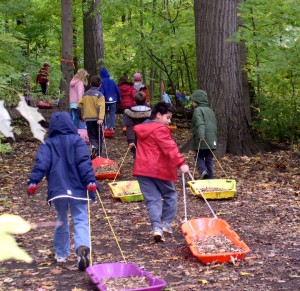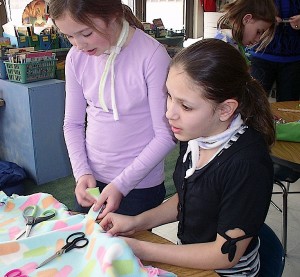Q: Will AAPS close any schools next year?
A: The reductions proposed for the 2010/11 do not contain recommendations to close any AAPS schools. Time is needed to do a thorough and thoughtful assessment of programs and facility usage, which will start in May via the Strategic Planning Process. Closing an elementary school would save approximately $500,000. There are many considerations to assess as part of analyzing whether to close a school such as:
• Impact on students and families
• Redistricting implications
• Additional transportation costs
• Potential loss of enrollment due to the school closing
Q: Why is it important for a school district to have a fund equity account?
A: Fund equity (cash reserves) is the district’s savings account. There are actually three kinds of fund equity: reserved, designated and undesignated. Reserved and designated fund equity are used to cover expenses that have already been identified or will occur shortly after the fiscal year ends, but have not yet been paid. Undesignated fund equity is cash on hand not earmarked for specific expenses.
The State of Michigan does not pay the district on a monthly basis but we need funds for those months (July and August) to meet payroll. Fund equity allows the district not to have to borrow for two months of expenses. Fund equity covers this shortfall. Fund equity also covers unforeseen emergencies. The district can also earn revenue on the fund equity account. The Board of Education has required the district to maintain fund equity at 15 percent of the annual operating budget (approximately two months average expenses).
The anticipated amount the district will have in fund equity at the end of the 2009/2010 fiscal year is approximately $19 million. Approximately $7 million was used this year to offset the mid-year loss of state funding. Without fund equity drastic mid-year reductions would have been necessary.

Q: Has AAPS considered any consolidation of services with other districts in the county?
A: Yes, AAPS has consolidated a number of services. The district:
• participates in the countywide substitute program.
• provides maintenance services for the Washtenaw Intermediate School District.
• supports and is working on the countywide transportation services consolidation plan.
• is working with other county districts regarding alternative education programs.
• is working to provide administrative services for other districts in the county, including human resources and maintenance.
• is in discussions with the Ann Arbor Transportation Authority to explore the use of AATA for some high school busing.
Q: Is AAPS still investigating privatizing bus drivers, custodians and maintenance services?
A: Yes, AAPS has completed a review of the RFPs for these services. AAPS is also working closely with employee groups representing these units to look for savings to equal what privatization could save the district. In addition, AAPS is working with the Washtenaw Intermediate School District on the proposed transportation consolidation efforts. We expect a final decision to be made sometime late April. The district is also working with the WISD to create a consolidated transportation model for all 10 local school districts. It is estimated that districts could save 20-25 percent in costs.
Q. What is the new Humanities program at the elementary schools and will there be reductions to elementary music?
A: Elementary students will continue to receive the high quality “threshold” fine arts and physical education experience the district has been committed to over the years. All elementary students will continue to participate in 60 minutes of art and two periods a week of physical education, vocal music, media/information literacy and technology and instrumental music in the fifth grade. In addition to this experience, students will have a humanities class taught by special area teachers twice a week. Humanities will connect core curricular outcomes primarily in science and social studies with applications in art, music, PE and technology. Grade-level technology skills will be be embedded with information literacy and content learning. Students will continue to have access to media centers, check out books and have instruction from the media specialist during ILT. Fifth-grade vocal music may focus more on composition.
Q. What is the impact of proposed teaching job reduction at the high school level?
A. Changes are expected for some elective class offerings and classes may increase in size to an average of 30 students.
Q: Will 7th Hour at the high schools be eliminated?
A: No. There is no plan to eliminate seventh hour at the high schools for the 2010-11 school year. It offers a period for students who need credit recovery or support services. Administration also recognizes the importance of seventh hour to many students especially those who take yearlong language and music performance as their electives. Seventh hour offers another class period to explore the rich elective curriculum AAPS offers.

Q. What is the impact of the proposed teaching job reduction at the middle school level?
A. Fewer sections of some elective classes are expected. Along with the changes proposed at the Student Planning Centers (see below) some increases in class size are expected with an average class size of 28 students.
Q: Will middle school student planning centers be eliminated?
A: No, The middle school administrators worked hard to preserve the student planning centers. The schools were able to develop their own plan to continue to offer this support. Many will no longer use a certified teacher to staff the planning center but instead have a trained para-educator in place to work with students.
Q: Will high schools implement “pay-to-participate” for athletics and extra-curricular activities?
A: Yes, the plan is to institute “pay-to-participate” for athletics. The current estimate will be around $150 for participation in after school athletic programs for the first sport and $50 for each additional sport. This would be in addition to any fees charged through the sport booster club to support the team. The fee would be collected by the school and deposited into the district budget to support AAPS athletics. No student would be denied participation in athletics because of an inability to pay. The middle schools will also institute a pay-to-participate fee for the athletic programs at $50 per school year, no matter how many sports a student wishes to play. A need-based assessment will be instituted at secondary schools ensuring access for all students.There will also be a fee to participate in non-athletic extra-curricular activities and a $50 maintenance fee for musical instrument rentals through the district.
Q: Will the district offer Schools of Choice?
A: Yes, the district is offering limited Schools of Choice in kindergarten (60 spaces), first grade (60 spaces) and sixth grade (50 spaces). Applications will be accepted April 1-30. Applications will be available at a2schools.org or by calling Student Accounting 734-994-2223. Elementary schools with openings include: Abbot, Bryant, Carpenter, Dicken, Eberwhite, Lakewood, Logan, Northside, Pittsfield and Wines. Each middle school will have 10 open spaces. Students may continue their education in the AAPS for the duration of their K-12 education. If the number of applicants exceeds openings, a random drawing system will be used to make a selection. A wait list will be maintained. Washtenaw County residents are eligible to apply.
Q: Will the district reduce Contract Services?
A: AAPS is always looking at ways to reduce contract services. The plan includes $300,000 in reductions in these services. However, many of these services are required especially pertaining to students with special needs. Approximately $172,000 in contract services from the general fund is used to fulfill mandatory Special Education needs and to maintain compliance with State and Federal law. This represents 20 percent of the total cost for these services, which are reimbursable from the state. Other contract services that have and are being examined for savings include maintenance agreements for work beyond the scope of staff such as heating and cooling units, pest control and technology services.

